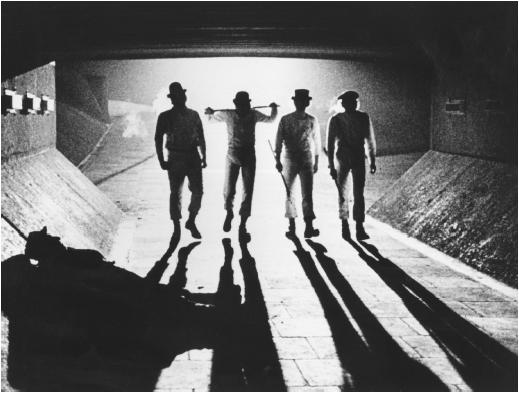 I won't call this a review, cos I don't know how far into that territory it will go...also I don't know if I could really review this film or even just articulate what I feel about it. It's been two days since I saw it and it's still in my mind, not quite ready to be released into words.
I won't call this a review, cos I don't know how far into that territory it will go...also I don't know if I could really review this film or even just articulate what I feel about it. It's been two days since I saw it and it's still in my mind, not quite ready to be released into words.It's the kind of film that comes along once or twice a year if you're lucky (and watch too many films a year). By that I mean, it's the special kind of film that sinks you right into its unusual world and then follows you wherever you go for a few days. The feeling is indescribable (or maybe that's a cop out way of saying 'I won't even try to understand my emotions towards this film').
Stanley Kubrick's A Clockwork Orange (1971) leaves you with recollections of its music, colours and the kind of stunning cinematography you wouldn't except to find in one of the most violent and controversial films (the word 'violence' needs to be used carefully however--it's not the kind that makes you want to turn away, but it does make you uneasy and unsettled). And then you're left with mixed feelings about the main character Alex, and of the systems which keep humans in order.
Could you ever imagine feeling sympathy for someone who rapes and beats up people for kicks? You just may if you see this film. The person in question is Alex DeLarge (played so very convincingly by Malcolm MacDowell), a young man who's apparently still in high school. He goes from being a delinquent with an eerie, dominant presence with a fetish for 'ultra violence' to a prison inmate who takes part in the new 'Ludovico' experiment to get out of jail.
This experiment, however, doesn't end up being the simple procedure he probably expected. It involves him being held down by this electrical equipment, his eyes clipped open, while he watches images of the activities that used to make him feel good. However, as he watched this images again, he only feels pain, and you see him squirming unbearably since he can't close his eyes. Gradually he's reinforced to see violence as bad.
And interesting things happen to your belief system. You noticed that he's being subjected to the kind of torture he used to take part in. He's transferred from the perpertrator to the victim, gaining your initially stubborn sympathy in the process. Secondly, he's getting 'treated' against his will, in that he didn't get to make the conscious decision to be good. We might feel that criminals forsook their liberty when they committed their crimes, but 'A Clockwork Orange' nonetheless sways you to look at things in another way.
And along the way you discover--perhaps while Alex's creepy eyes from the beginning are still in your consciousness--that this young man can be funny and intelligent. And during the post-prison scenes where he comes back into society, the ill-treatment he receives actually makes you feel kind of bad for him. I know, I know, how can this be? It's these weird torn effects that make the film so enthralling.
Stanley Kubrick is often referred to as a 'visionary director' and you can see a unique, bizarre vision unfolding itself in front of your eyes. It doesn't turn out to be the film you'd expect by reading reviews and just looking at the dvd cover. Simply because what it turns out to be is nothing you'd imagine. I think it's brave of Kubrick to step so out of the square--risky, unconventional films either become rejected or they're placed above most other films. I think 'A Clockwork Orange' falls in the latter category.
It's also risky for another reason, which is its content: constant phallic symbols, rape, nudity, are perhaps hard to digest, and maybe it's even more jarring when Beethoven's music is in the background in these scenes. With such a content it's not the kind of film I'd expect myself to rave about, and I still feel a little weirded out by how much I liked the film, but it really is a film to wonder and ponder about.
Moving back to Kubrick, the other intriguing thing I found out about him is that he's a perfectionist. Apparently he likes to sometimes do up to 30 (or was it more...) takes for a scene. He often worked a considerable long time on each film, and as a result he made about 2-3 films in each decade from the 50s till the 90s. And if you go on Imdb, astonishingly, most of them are either in the top 250 or rated above 7.5. Which is kind of rare. I really look forward to seeing and reflecting on his other work.

In response to the lovely comment you left on my lefties blog:
ReplyDeletei love you! you are so damn sweet. and you are definetly up there with those wonderful people too <3